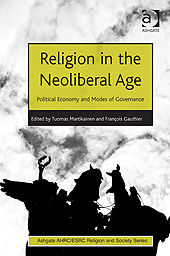CALL FOR PAPERS:
Post-Secularism: Between Public Reason and Political Theology
A Special Issue of THE EUROPEAN LEGACY
http://www.tandfonline.com/toc/cele20/current
Guest Editors: Camil Ungureanu (Universitat Pompeu Fabra, Barcelona) and Lasse Thomassen (Queen Mary, University of London)
This special issue is scheduled for late 2014.
CALL FOR PAPERS:
In recent years, leading philosophers, including Jürgen Habermas, Charles Taylor, and or John D. Caputo, have criticized "old-style" secularism and proposed instead a post-secular model for understanding the relation of religion and democracy, faith and reason. There are however profound theoretical and practical divergences in the post-secular models proposed. First, what are the precise characteristics of post-secularism as a philosophical alternative? In what sense could it be said to break with secularism? Second, what are the practical political and legal consequences of adhering a post-secular approach? From a critical theoretical perspective, Habermas focuses on a revised concept of public reason and deliberation in promoting an active interaction of democracy and religion. From a hermeneutical perspective, Taylor’s recent work centres on the new "conditions of belief" and the dilemmas inherent to both religious and atheist experience. In contrast, Caputo and Richard Kearney develop a Derridean aporetic understanding of the nexus of democracy and religion, faith and reason, whereas Hent de Vries, William Connolly and Simon Critchley reject Habermas’s rationalist approach and propose a distinct understanding of post-secularism by focusing on Schmitt’s and Benjamin’s re-appropriation of the tenets of Saint Paul in their political-theological works. Although these trends have been studied to some extent, there has been no sustained attempt so far to subject them to a comparative analysis that would more fully address the issue of “post-secularism.”
Our "Call for Papers" invites scholars to submit a study, with a comparative dimension, that addresses both the philosophical import and the practical-political effects of the post-secular alternative. The work of the following authors will be at the centre of our proposed special issue: Habermas, Taylor, Caputo, Critchley, Connolly, Gianni Vattimo, Jacques Derrida, Slavoj Žižek, Giorgio Agamben, and Jean-Luc Nancy. Comparative studies that focus on various religious traditions (Christian, Hindu, Islamic, Buddhist, Confucian, etc.) and theologians, and those that focus on the public role of religion in democracy (e.g., Rawls, Weithman, Wolterstorff) are particularly welcome.
Possible topics include, but are not limited to:
- Significance and varieties of post-secularism
- Open secularity, post-secularism or political theology?
- Deliberative post-secularism or political liberalism
- Post-secularism: religious imagination and practice (Christian, Islamic, Hindu, Confucian, Buddhist, etc.)
- Discussion of (legal, moral or political) practical cases from a post-secular perspective
- Is political theology useful for re-thinking democracy?
- Varieties of political theology today
- Re-thinking the legacy of Saint Paul
- Visions of sovereignty: between proceduralism and political theology
- Faith: religious? secular?
- Post-secularism and feminism
- The state of exception between deliberation and political decision
- Rethinking solidarity from a postsecular perspective
Deadline for submissions: 27 October 2013
Length of essay: 6,000 – 8,000 words, including notes. (For the referencing style, please consult http://www.tandfonline.com/toc/cele20/current)
Potential contributors are welcome to contact the editors to discuss their proposed essay.
Camil Ungureanu (camil.ungureanu@upf.edu)
Lasse Thomassen (l.thomassen@qmul.ac.uk)




